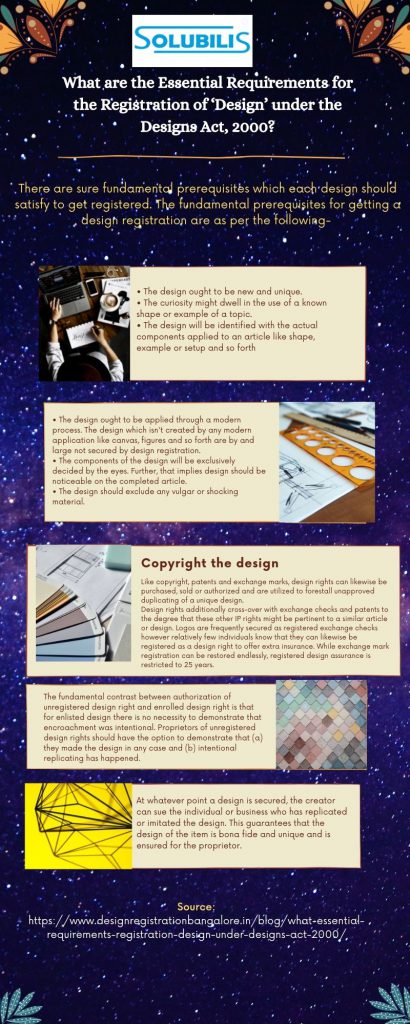TALK TO EXPERTS
Design registration can be gotten for any design that is tasteful in nature. Further, to get the registration the design should be unique and novel. Design can be characterized as the actual provisions of the item like shape, design, design, the mix of lines or shadings and so forth applied to an article by the method for mechanical process. The design registration once acquired is legitimate for the time span for a very long time and from that point onward, a reestablishment of additional 5 years can be gotten.
There are sure fundamental prerequisites which each design should satisfy to get registered. The fundamental prerequisites for getting a design registration are as per the following-
- The design ought to be new and unique.
- The curiosity might dwell in the use of a known shape or example of a topic.
- The design will be identified with the actual components applied to an article like shape, example or setup and so forth
- The design ought to be applied through a modern process. The design which isn’t created by any modern application like canvas, figures and so forth are by and large not secured by design registration.
- The components of the design will be exclusively decided by the eyes. Further, that implies design should be noticeable on the completed article.
- The design should exclude any vulgar or shocking material.
- Design ought not to have been unveiled to the public anyplace preceding its distribution.
- The design should not be practical in nature.
Merits of design registration
An appropriate design makes any article or adornment alluring just as engaging. Subsequently, it upgrades its business esteem and, simultaneously, expands the attractiveness of the item.
At whatever point a design is secured, the creator can sue the individual or business who has replicated or imitated the design. This guarantees that the design of the item is bona fide and unique and is ensured for the proprietor.

Design registration ensures the picture or diagrammatic portrayal of items or bundling. Many organizations rely upon copyright and furnish themselves with legitimate inclusion. Nonetheless, if there should be an occurrence of contention, the other party challenging the legitimacy of copyright needs to demonstrate something similar. Thus, a design registration can be viewed as the ideal choice to demonstrate the rights’ legitimacy.
At whatever point a fashioner adds something special and imaginative to its item, it adds individual person to the design. The uniqueness has its methodology in the market that helps structure its own place between every one of the current items.
Copyright the design
A design might be secured under copyright and unregistered design right and may likewise have the option to be registered as a registered design. While copyright will essentially ensure any creative or abstract work included inside an item or archives enumerating the design of an item, design right spotlights more on the shape, design and presence of it. Like copyright, unregistered design right remains alive naturally on production of a design – there is no process to follow to get insurance.
Like copyright, patents and exchange marks, design rights can likewise be purchased, sold or authorized and are utilized to forestall unapproved duplicating of a unique design.
Design rights additionally cross-over with exchange checks and patents to the degree that these other IP rights might be pertinent to a similar article or design. Logos are frequently secured as registered exchange checks however relatively few individuals know that they can likewise be registered as a design right to offer extra insurance. While exchange mark registration can be restored endlessly, registered design assurance is restricted to 25 years. Likewise it is absurd to expect to register a design that has been freely accessible over a year prior applying for enlistment, though there is no such limitation on recording an exchange mark application.
Patents secure the way that something works as opposed to its appearance. So despite the fact that there might be some cross-over where a piece of the presence of an item influences how it functions, the assurance acquired by a patent is a lot more extensive than what is presented by an registered design right.
To give an instance of covering types of IP security, a versatile application might include copyright to the degree of the product code, design rights to the degree of the appearance and feel of the screen show or realistic symbols and furthermore perhaps patent rights relying upon whether it includes another creation.
Difference between design right and patent
A patent should meet severe necessities of curiosity and creative advance, and secures the manner in which something works instead of its appearance. Accordingly, a patent isn’t appropriate where it is the shape or the presence of an item that necessities ensuring.
Patents are a lot harder and more costly to get contrasted with the fast and financially savvy process of enlisting design rights. This makes enlisted design rights a decent choice for organizations looking to secure advanced and new media items, for example, applications and PC games. Like patents, a registered design right gives the proprietor an imposing business model in their design and the option to make a legitimate move to keep others from taking advantage of an item indistinguishable or like that enlisted without the proprietor’s assent. There is no compelling reason to demonstrate replicating and, similar to patents, an registered design proprietor can keep someone else from delivering an item that seems to be indistinguishable or like the proprietor’s, regardless of whether they guarantee to have never even seen it.
Enforcement of design right
To implement both enlisted and unregistered design rights, encroachment procedures can be brought by the inquirer under the watchful eye of the courts to look for:
- damages or a record of benefits
- a directive to forestall further encroachment, and
- A request for conveyance up or obliteration of the encroaching articles.
There are covers fair and square of harms and costs that can be acquired.
The fundamental contrast between authorization of unregistered design right and enrolled design right is that for enlisted design there is no necessity to demonstrate that encroachment was intentional. Proprietors of unregistered design rights should have the option to demonstrate that (a) they made the design in any case and (b) intentional replicating has happened.
